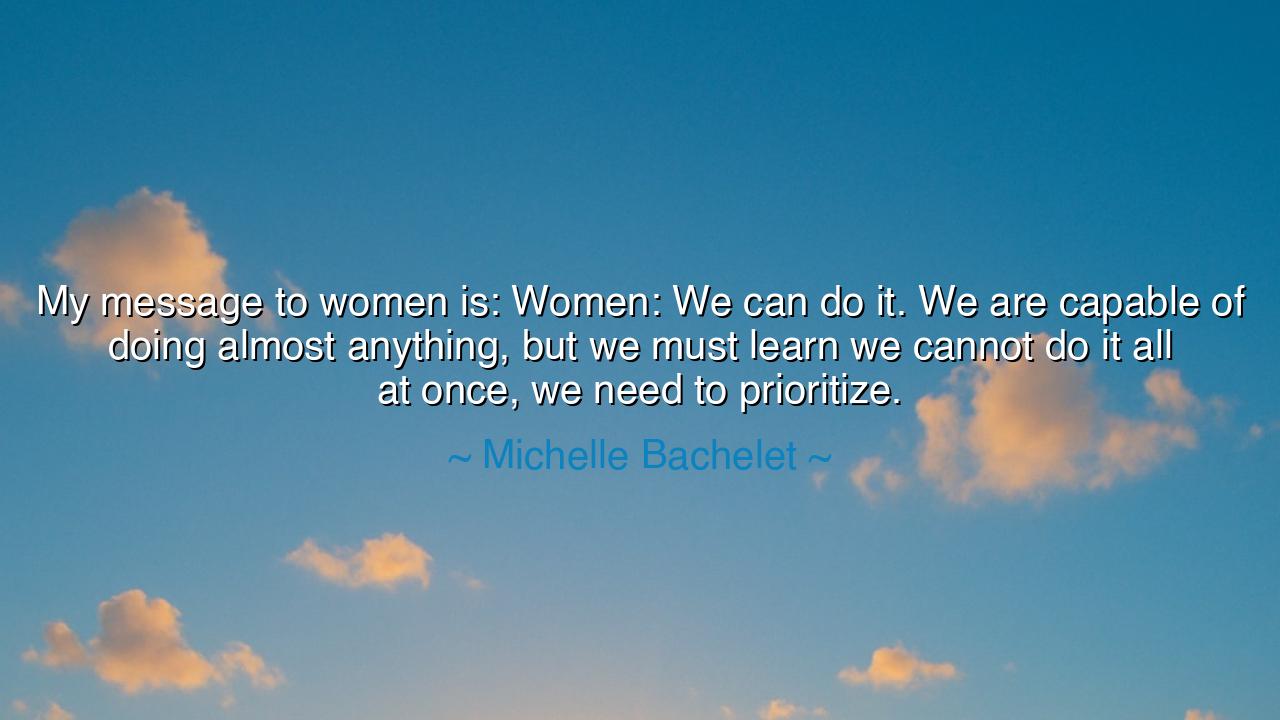
My message to women is: Women: We can do it. We are capable of
My message to women is: Women: We can do it. We are capable of doing almost anything, but we must learn we cannot do it all at once, we need to prioritize.






The words of Michelle Bachelet — “My message to women is: Women: We can do it. We are capable of doing almost anything, but we must learn we cannot do it all at once, we need to prioritize.” — ring with the authority of one who has walked the long road of both hardship and triumph. They are not the idle encouragement of a dreamer, but the seasoned wisdom of a leader who knows the burdens that history has placed upon women, and the strength that rises when those burdens are faced with courage and clarity.
The meaning is twofold: first, that women are indeed capable of greatness, of shaping nations, leading communities, healing families, and breaking barriers once thought unshakable. But second, that this greatness must be guided by wisdom. To attempt all battles at once is to scatter strength, but to prioritize is to concentrate power, striking in ways that change destiny. Bachelet speaks as a strategist of life, urging women to know not only their strength, but the order in which to wield it.
Her own story reveals the origin of this truth. As the first female President of Chile, Bachelet broke centuries of precedent, balancing the roles of physician, mother, exile, and stateswoman. She faced military dictatorship in her youth, survived imprisonment, and rose again to lead her nation with dignity. In her leadership, she learned that one cannot fight every battle in a single hour — reforms must come step by step, victories are built in sequence, and the art of prioritization is as vital as the fire of ambition.
History offers echoes beyond her own. Think of Harriet Tubman, who, though capable of saving many, understood that freedom had to be won one journey at a time, one group at a time. She did not rush blindly into the impossible; she prioritized safety, secrecy, and strategy. And because of this wisdom, she rescued not only dozens in her own lifetime but lit the flame of liberation for generations to come. Her life, like Bachelet’s words, teaches that capacity must walk hand in hand with clarity.
Let this lesson be handed down: yes, women can do anything, but the strength of doing lies not in rushing to conquer all at once, but in wisely choosing where to begin. For destiny is not seized in chaos, but built step by step, stone upon stone, until the impossible is made real. Bachelet’s call is both empowering and sobering: do not doubt your might, but learn the discipline of focus. In this balance lies the power to move mountains — not in a single instant, but through the steady triumph of time.






TDnguyen tien dat
Bachelet’s quote feels like both an encouragement and a challenge. It celebrates women’s capabilities but also acknowledges the need for boundaries. But in a world where women are often expected to be 'everything' to everyone, how do we learn to prioritize without feeling guilty for not doing more? How can we support women in carving out space for their own goals and needs, while balancing the expectations placed on them by others?
TMBui Nguyen Tra My
Michelle Bachelet’s message feels like a balancing act: women are incredibly capable, but the world often expects them to do everything at once. This could be an opportunity to rethink societal expectations and allow women to embrace what they truly value, without feeling like they must constantly juggle everything. Can we shift the narrative from 'doing it all' to 'doing what matters most,' and how would that change the way women are perceived in society?
KNKhoa Nguyen
This quote is a powerful reminder of the capabilities women possess, but it also highlights a challenge many face: the pressure to 'do it all.' Prioritizing is essential, but how often does society push women to take on everything at once, leaving little room for self-care or rest? Should the focus be on encouraging women to excel in what matters most to them, instead of trying to meet external standards of perfection?
TDThao Dieu
Bachelet’s message is empowering, reminding women of their potential and strength. However, the idea of prioritization resonates with the pressures women face daily, balancing multiple roles—whether as professionals, caregivers, or individuals. But is it unfair to ask women to prioritize, while also expecting them to excel in all these areas? Does this message inadvertently reinforce the unrealistic expectation that women must be exceptional in everything they do?